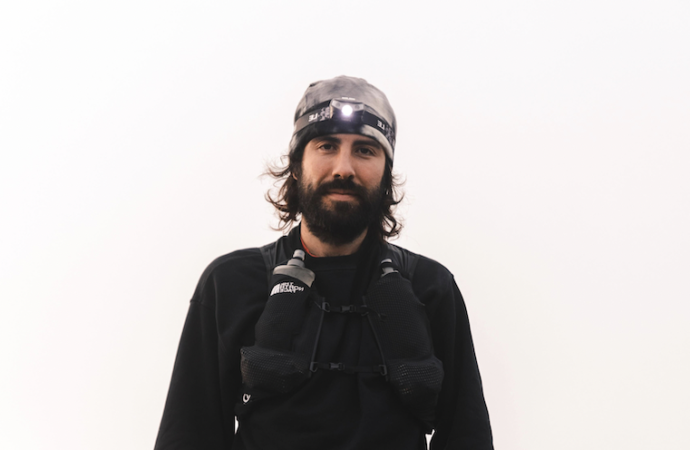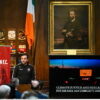Formerly running from box to box in Swindon Town’s midfield, Michael Doughty has continued making moves away from the pitch as the club’s chief sustainability officer and co-founder of sustainable running brand Hylo Athletics
In retirement, most professional athletes find new challenges across all walks of life, but some encounter pursuits while still playing that are compelling enough to motivate retiring so that more time can be devoted towards them.
Hanging up his boots in 2020 at the relatively young age of 28-years-old, Michael Doughty was one such athlete, co-founding Hylo Athletics in the same year.
It all started through a pretty innocuous question from his co-founder Jacob Green. “What brands do you subscribe to as an athlete?” he asked. A feeling of disconnection descended up Doughty, who started tio question the brand messages he’d been affiliated with throughout his career.
He describes “a Pandora’s box starting to open”, ultimately leading to the idea of creating a new brand with environmental advocacy at its core.
Doughty’s passion for the environment and nature is evident as he reminisces about watching David Attenborough documentaries when he was a teenager. “It wasn’t necessarily an interest in sustainability at the beginning,” he says, “just an interest in the outdoors and in sport that subsequently led me to learn about some of the issues that we’re seeing in terms of climate change, and ultimately, I guess, press me to want to spend my career after football doing something that I thought was impactful in that space.”
It was Doughty’s role in creating Hylo that motivated Swindon Town – the club he retired at and played most of his career with – to reach out about a potential partnership, but the conversation led to a wider discussion about the club’s approach towards sustainability. Doughty became the club’s chief sustainability officer in February earlier this year – the first role of its kind for an ex-footballer at any club.
Swindon’s sustainability journey began in 2021 when it signed up to EFL (English Football League) GreenClubs, a framework provided by GreenCode for EFL clubs to become more sustainable. As a unifying mechanism between clubs, GreenCode can help disseminate Doughty’s desire for the football industry to collectively imagine the sport without a healthy environment, both in terms of the speed and skill with which it’s played and the kinds of advertising that underpin what happens on the pitch.
Doughty envisions Swindon as a beacon to share ideas and encourage other clubs to become more sustainable, and his message is simple: “With a relatively limited budget and relatively limited resources, we can still do some pretty powerful and impactful stuff.”
One of, if not the biggest stakeholder group to engender this impact are the players. Doughty notes that many players he encounters feel stifled by feeling unqualified to speak about climate change if they don’t understand the science behind it. A big part of what he enjoys doing is trying to simplify some of the information that’s out there into digestible segments, he says.
“If you’re not a scientist, then how can you be expected to fully understand all the details? The biggest pushback I have is that nobody is perfect,” a sentiment he’s also embedded into Hylo: ‘The biggest paradox for us is that we are creating new products that have an environmental impact when we believe that the solution is consuming less’, the company writes on their website.
Swindon has allocated an annual budget towards sustainability, ultimately aiming for their efforts to add commercial value to the club. This is also top of Doughty’s agenda for Hylo, fully aware that the bigger the brand becomes, the bigger their impact.
“Although we’re doing some really great and important work, we’re still a flea on the elephant, and I would rather be the elephant,” he laughs. “I’m a competitor, that’s part of my story, and that’s where the competitor in me wants to be so I can know that we are delivering truly global impact for good.”
Simultaneously, Doughty acknowledges his impatience to reach this destination rather than progressing one step at a time, but recalls a lesson about presence that he learned on the pitch. He describes his early attempts at producing a running show – an industry he had no previous experience in – differently to anyone else as a “pretty stupid idea”.
Bu there’s something in a professional athlete’s drive, honed for years in an extremely competitive environment, that’s worth recognising here. Athletes transitioning from playing careers to entrepreneurship, sustainability-motivated or otherwise, already have a thick skin from facing adversity that many others may not.
Possessing the ability to keep progressing through the seemingly never-ending ups and downs of success and adversity associated with entrepreneurship can lead to innovations that wouldn’t otherwise exist. For instance, Hylo’s shoes use far less fossil-fuel derived materials than other brands, and while they are not 100% bio-based yet, that firmly remains the aim.
“Hylo is very much a way for me to express my joy in the environment and my love of nature. I would encourage all athletes to think of an authentic way that resonates with themselves that they can express their true personality in the world, because they have a unique history to which they can define their own legacy. That might be really small, like me, in terms of, you know, I wasn’t a hugely successful world-renowned footballer, but I still have a little bit of a platform to define my own legacy. And I think it’s important that athletes realise that.”
Opt into our weekly newsletter for exclusive content focused on sustainability strategy, communication and leadership for sport’s ecosystem.










Leave a Comment
Your email address will not be published. Required fields are marked with *